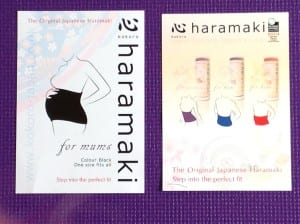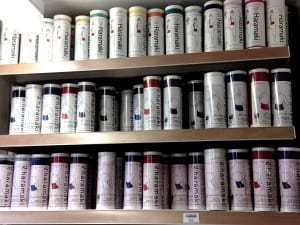As a girl growing up I have memories of my Japanese mother often telling me to ‘keep my tummy warm’ in order to take care of my health. No crop tops for me.
It was a natural belief for her and the generations before her that the health of our whole body is inextricably linked to the wellbeing of our centre, or our core as we often call it here. This centre is believed to be the seat not only of our vitality, but of our power too.
If you take a look at traditional Japanese clothing, anyone from a samurai warrior to a pregnant woman can be seen wearing a supportive, protective sash – a haramaki – around their waist.
While the haramaki originates from Japan it is now becoming more popular in the West.
Today’s version can be worn directly next to the skin or as an outer layer, both indoors and outdoors. It is said to be beneficial during relaxation, everyday activities and sport as it provides both comfort and support. It is also said to aid digestion and when worn in bed to encourage a comfortable, good night’s sleep. Indeed, its theory and coverage of many of our vital organs make its health benefits seem logical.
A friend of mine told me that she wouldn’t be without her haramaki each month to reduce menstrual cramps.
Like many women, I can really feel the cold. The inevitable extra blanket can be found on my side of the bed. When writing at my desk I often wrap a fleece blanket around my middle.
I was therefore curious to try wearing a modern-day haramaki or ‘tummy wrap’.
Having also heard how popular it is with movement practitioners (including aerial acrobats and pole dancers who work very strongly from their core) I was keen to see how it felt during yoga practise.
Haramaki and yoga practice: heat, core awareness, strength
Its effect of creating heat in asana (physical yoga) practise is, in short, incredible.
In the autumn and winter I use an additional heater in my practice room in order to feel comfortable and to guard against injury. Having had 15 years of ballet training in my youth I know not to practise without careful warming up or an adequate room temperature.
With the haramaki on, I turned off my additional heater after about five minutes of practice and didn’t need it again, including during sitting for pranayama (breathing techniques) and meditation.
My body became warmer much more quickly – with associated benefits in terms of flexibility – and retained the heat. The haramaki boosts circulation.
Using ujjayi breathing throughout the practice, I could literally feel the flow of warmth, breath and prana (energy/life force) moving from my centre through my limbs to the tips of my fingers and toes. It felt good. The sensation of aliveness in my extremities enhanced the sense of my body as one unit.
This flow from the centre fits beautifully with the sense of fully integrated movement that originates and moves from the centre outwards and back in again. We first develop this natural pattern in the womb.
It also encourages working with strength from the centre outwards. This can only benefit physical yoga practice in terms of a safe practice based on both stability and integrity. Whether in standing balances or in headstand I felt aware, strong and supported at my core.
The haramaki is soft and elasticated, so moves easily with you and feels like a second skin.
Haramaki during everyday activities: warmth, wellbeing, support
I find the haramaki to be completely comfortable to wear during the day too, whether working at my desk or moving about. It takes away the piercing chill of the outdoors in colder months.
The warmth in the tips of my fingers and toes is welcome.
While at my desk I feel an awareness of my centre together with subtle support for my lower back. This encourages me to sit up straight. This could well be helpful if you have niggling lower back ache.
I imagine it would feel as good to wear when running as when gardening.
When my husband was on the other side of the world for work I wore it in bed and slept well.
It is difficult to describe in words, but the haramaki simply gives a sense of being well in oneself.
And with the physical body feeling well the mind is free to focus well. An invaluable added bonus.
Samurai or not, the haramaki is a great find.
Photos: author’s own
I received a kokoro haramaki (made in Japan) as a gift from Natural Health, an independent, award-winning store with branches in Hertford and Welwyn, Hertfordshire. It is made of 97% pure brushed cotton and 3% elastic and is machine washable. For men, women and children. There is a special one for pregnant women which returns to its original size post-pregnancy. www.naturaltherapycentre.co.uk and www.kokoro-japan.co.uk

